|
|
|
Sort Order |
|
|
|
Items / Page
|
|
|
|
|
|
|
| Srl | Item |
| 1 |
ID:
104171
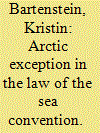

|
|
|
|
|
| Publication |
2011.
|
| Summary/Abstract |
This article examines the so-called "Arctic exception," Article 234 of the 1982 UN Convention on the Law of the Sea. Article 234 is intended to give the coastal state of ice-covered sea areas the necessary powers to prevent, reduce, and control vessel source pollution, which poses a particular risk to the highly sensitive Arctic marine environment. The aim of this article is to present a thorough interpretation of Article 234 in order to eventually evaluate the provision's significance for Arctic navigation, specifically in the Canadian Arctic and the Northwest Passage.
|
|
|
|
|
|
|
|
|
|
|
|
|
|
|
|
| 2 |
ID:
104179
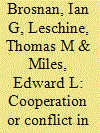

|
|
|
|
|
| Publication |
2011.
|
| Summary/Abstract |
The possibility of conflict among nations has dominated discussions of the future of the Arctic. Are there no opportunities for cooperation? This article explores the avenues and incentives for Arctic cooperation through the common issues outlined in the strategy statements of the five coastal Arctic states. Incentives to cooperate can be found in all the thematic areas examined: sovereignty, scientific research, resource development, shipping, and environmental concerns. Cooperation is already occurring on some salient issues. Additional cooperation may occur as issues become increasingly pressing. From this perspective, Arctic conflict is by no means inevitable. Numerous avenues for cooperation exist.
|
|
|
|
|
|
|
|
|
|
|
|
|
|
|
|
| 3 |
ID:
104173
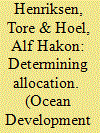

|
|
|
|
|
| Publication |
2011.
|
| Summary/Abstract |
This article discusses the allocation problem in international fisheries management, which is critical to effective resource management. A number of cases where allocation problems exist are reviewed and trends identified. It is concluded that power relationships between the states involved are an important determinant of allocation outcomes. While this may seem a frustrating conclusion, it nevertheless reflects the realities of international cooperation.
|
|
|
|
|
|
|
|
|
|
|
|
|
|
|
|
| 4 |
ID:
104176


|
|
|
|
|
| Publication |
2011.
|
| Summary/Abstract |
This article explains the position(s) of the United States in the maritime dispute adjacent to Svalbard. While the United States has regarded Norway's exclusive claim to the natural resources outside Svalbard as everything from "wishful thinking" to legally plausible, Washington maintains that it may have rights under the 1920 Svalbard Treaty to exploit the maritime zones adjacent to the archipelago. The U.S. reservation is the result of assessments and reassessments of legal considerations as well as national interests.
|
|
|
|
|
|
|
|
|
|
|
|
|
|
|
|
| 5 |
ID:
104177


|
|
|
|
|
| Publication |
2011.
|
| Summary/Abstract |
Marine spatial planning (MSP) has been gaining in stature recently as an ecosystem-based tool for the management of marine space that promotes the sustainable and optimal use of resources with minimal stakeholder conflicts. Malta is the quintessential maritime nation, with a disproportionately large marine area compared to its terrestrial area. Nonetheless, its limited coastline, a considerable portion of which is inaccessible, poses inevitable conflicts between multiple marine activities and designations, including aquaculture, fishing, bunkering, coastal tourism, navigation, renewable energy installations, conservation of biological diversity and protected areas (on ecological criteria). This article makes the case to implement MSP-based policies and an applicable legal framework in the Maltese Islands.
|
|
|
|
|
|
|
|
|
|
|
|
|
|
|
|
| 6 |
ID:
104170
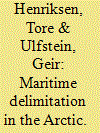

|
|
|
|
|
| Publication |
2011.
|
| Summary/Abstract |
During a visit to Norway by the Russian president in the spring of 2010, the president and the Norwegian prime minister surprisingly announced agreement on a delimitation line in the Barents Sea ending almost 40 years of negotiations. The agreement was signed in Murmansk on 15 September 2010. This article presents the background of the dispute and undertakes an assessment of the agreement and its implications for the Barents Sea, Svalbard, and other Arctic maritime delimitations.
|
|
|
|
|
|
|
|
|
|
|
|
|
|
|
|
| 7 |
ID:
104174
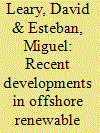

|
|
|
|
|
| Publication |
2011.
|
| Summary/Abstract |
This article examines the emergence of offshore renewable energy (i.e., offshore wind, ocean, and tidal energy) in the Asia-Pacific region with a particular focus on developments in China, South Korea, Australia, and New Zealand. It outlines plans for the development of offshore wind, tidal, and wave energy projects as well as emerging legal and policy measures supporting the growth of offshore renewable energy in the region. The article highlights that, although some progress has been made on laws and other measures to facilitate offshore renewable energy in the Asia-Pacific region, clear regulatory frameworks are still emerging in these jurisdictions.
|
|
|
|
|
|
|
|
|
|
|
|
|
|
|
|
| 8 |
ID:
104178


|
|
|
|
|
| Publication |
2011.
|
| Summary/Abstract |
The past stormy fisheries relations between Canada and the European Union, in particular with Spain, has been replaced by uncertainty in the application of the newly amended Northwest Atlantic Fisheries Convention. These issues are addressed in this article that sheds light on the more peaceful fishing relations between the two leading international actors in this area of the oceans.
|
|
|
|
|
|
|
|
|
|
|
|
|
|
|
|
| 9 |
ID:
104172


|
|
|
|
|
| Publication |
2011.
|
| Summary/Abstract |
This article examines the 2008 Sino-Japanese Consensus on the East China Sea in the context of the seemingly vague obligations in the Law of the Sea Convention regarding overlapping claims for states to "make every effort to enter into provisional arrangements of a practical nature." The conclusion reached is that, while the claims of the two states in the East China Sea are based in good faith, there is a lack of reciprocity in the Consensus that helps explain it's fragile nature.
|
|
|
|
|
|
|
|
|
|
|
|
|
|
|
|
|
|
|
|
|